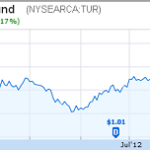Exchange-traded funds have commoditized broad allocation strategies. As exchange-traded funds require only a modest amount of overhead and competition intensifies, fund fees plunge with each passing day.
The Lowest Cost ETFs
Below are the five least expensive exchange-traded funds:
- Focus Morningstar Large Cap Index ETF (FLG) – This FocusShares fund based on the Morningstar Large Cap Index tracks 265 total holdings, but market cap weighting means it has as much as 25% of the fund invested in the largest 10 companies in the index. All large-cap and all US-based, you won’t find much difference in this fund compared to other market-cap weighted funds based on the S&P500 index. However, with fewer holdings, the fund has far more exposure to the largest firms than does the broader S&P500 index.  The expense ratio is .05%.
- Focus Morningstar US Market Index ETF (FMU) – Market capitalization weighted, this fund seeks to cover 97% of the large caps available on the market. The fund trades with a low .05% annual expense to investors, but low volume means that investors have not yet taken to low fee funds exclusively. The underlying index maintains exposure to 1674 holdings, an impressive diversification level given the low cost of ownership. The underlying index is a product of Morningstar, but the fund is managed by the smaller ETF issuer FocusShares.
- S&P 500 ETF (VOO) – A Vanguard exchange-traded fund, and a popular choice among so-called Bogleheads, the VOO ETF tracks the S&P500 index as designed. Market cap weighted to track the 500 stocks in the S&P500 index, Vanguard charges only .06% per year to manage the fund. Economies of scale earned through Vanguard’s extensive mutual fund business and patented fund structure ensures that Vanguard will always be one of the companies with the lowest fees.
- U.S. Broad Market ETF (SCHB) – Charles Schwab is new to exchange-traded funds fearing that the fund structure would eat into its higher-end fund and brokerage model. The company launched one of its first funds, the SCHB ETF, based on the Dow Jones U.S. Broad Stock Market Total Return Index, a float adjusted and market cap weighted index. SCHB costs investors a meager .06% per year to own in their portfolios. The fund holds positions in 1575 different companies.
- Total Stock Market Index ETF (VTI) – Another Vanguard finds its way to the lowest cost ETF list with an annual expense of .07% per year. The Total Stock Market is just as it sounds – the index tracks at least 99.5% of all stocks on the market by market cap. The fund goes so far to dig into smaller stocks, including those traded on the smaller American Stock Exchange platform as well as equities traded over-the-counter. The VTI ETF holds a whopping 3326 securities.
A Trend in Lower Costs
The trend is quite clear; the lowest cost ETFs are almost always centered around massive, diversified portfolios invested in companies on domestic exchanges. Investors looking for long-term retirement planning options would do quite well investing in any of the above lowest cost ETFs to displace their stock holdings.  In fact, here are several ways to trade ETFs for free or even trade free above and beyond just ETFs for opening an IRA account.
Investors seeking balance with bond and fixed-income ETFs will have to pay a premium. PIMCO’s 1-3 Year US Treasury Index Fund ETF (TUZ) is the least expensive bond fund at .09% per year. The second lowest cost bond fund is the SCHZ ETF, a Charles Schwab tracking the aggregate investment grade bond universe with a price tag of .10% per year. Bond funds seem to be most populous in the .15% fee range, where many different, specialized bond funds begin to find a competitive balance between lower costs and less liquid fixed-income markets.  Investors seeking high yield ETFs will tend to pay more due to lower volumes and higher bid-ask spreads.
At any rate, the reality is quite clear: any investor can find a cheaper mutual fund option with ETFs.
To save money when purchasing one of these ETFs it makes sense to use a discount broker like TradeKing. TradeKing not only costs $4.95 per trade, but offers various promotions to save money when signing up.
Disclosure: No positions in any ETFs covered in this article.











{ 1 comment… read it below or add one }
Wow, I didn’t know MER’s could go that low. Thanks for the list
{ 1 trackback }